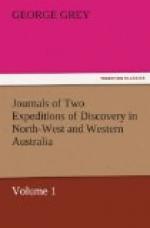We here first hoisted the British flag, and went through the ceremony of taking possession of the territory in the name of Her Majesty and her heirs for ever.
The next few days were passed in moving the stores from the landing-place to the tent; as it was necessary that before I allowed the schooner to start we should be amply provided with all necessaries so as to be able to maintain ourselves for some time, in the event of anything happening to the vessel: this was very fatiguing work for the whole party but they all exerted themselves with the most strenuous energy, especially Mr. Lushington; and our labours were varied by several amusing novelties which relieved the monotony of the employment.
Remarkable fishes.
Sometimes as we sat at our dinner near the landing-place we watched a strange species of fish (genus Chironectes, Cuvier). These little animals are provided with arms, at least with members shaped like such as far as the elbow, but the lower part resembles a fin; they are amphibious, living equally well on the mud or in the water; in moving in the mud they walk, as it were, on their elbows, and the lower arm or fin then projects like a great splay foot; but in swimming the whole of this apparatus is used as a fin. They have also the property of being able to bury themselves almost instantaneously in the soft mud when disturbed. The uncouth gambols and leaps of these anomalous creatures were very singular.
Another remarkable fish was a species of mullet which, being left by the retreat of the high tides in the pools beyond the rounded rocks at the head of the landing-place, was obliged to change its element from salt to fresh water, which by a very remarkable habit it appeared to do without suffering any inconvenience. The natural hue of this fish was a very pale red, but when they had been for some time in the fresh water this reddish tinge became much deeper, and when of this colour I have found them in streams a considerable distance from the sea, as if, like our salmon, they had quitted it for the purpose of spawning. Indeed birds, insects, and all things we saw, were so new and singular that our attention was kept constantly excited by the varied objects which passed before us.
December 11.
I went on board in the morning for the purpose of preparing my letters, and about 10 A.M. it was reported to me that a party of natives had come down to one of the sandy beaches and were fishing there. I immediately went upon deck and saw four natives in the sea opposite to the beach, running about and fishing. Captain Browne went on shore at once with me to try and parley with them, but as we approached the land they ran away; we remained for some time on the beach and tried to follow their tracks up into the country, but could see nothing more of them.
This night at 8 P.M. we had another sudden squall from off the land, accompanied with thunder, lightning, and heavy rain; it blew so hard that we were obliged to let go the best bower anchor, but as usual it only lasted twenty minutes.




